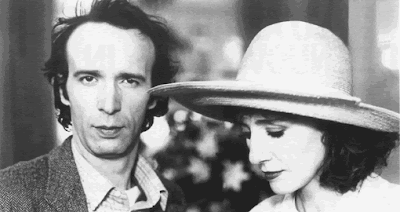Today, I attended a screening of "La voce della luna" (The voice of the moon). It was Federico Fellini's last film and is a wonderful tribute to the director's signature poetic madness. The film gave Benigni the opportunity to team up with fellow beloved comic, Paolo Villaggio, and the two created a truly unforgettable adventure. Today's screening began with an introduction by Benigni. The moments leading up to his introduction were noticeably serious and somewhat tense. Benigni's publicist and TIFF security staunchly guarded his privacy. There was no interaction and no photos were allowed. Guided by his entourage, he walked quickly from the Green Room to the theater, looking straight ahead and ignoring calls from the press. However, when Benigni hit the stage to talk about his experience with Fellini and Villaggio, his enthusiasm and presence lit up the room. His detailed account of their collaboration was both endearing and hilarious.
Roberto Benigni
With a larger-than-life personality that immortalizes every character he plays, Roberto Benigni is one of the most recognizable faces in Italian cinema.
Born in 1952 in Tuscany, his beginnings were humble. Benigni’s mother worked as a fabric inspector in the textile industry and his father, Luigi, was a farmer, carpenter and bricklayer. Luigi was a prisoner for two years in the Bergen-Belsen concentration camp in northwestern Germany. The camp was liberated by the British 11th Armored Division in 1945 and Luigi was freed. Benigni called upon his father’s experience to make his Oscar-winning film, "Life is Beautiful."
Benigni started his career in Roman theaters, earning a reputation as one of the area’s funniest comics. He then moved on to television, where he quickly became a national sensation. Considered a genius by his idol, Federico Fellini, Benigni lived up to that honor when he made the transition to the big screen. His first major movie hit came in 1985 with "Non ci resta che piangere" (Nothing Left to do but Cry), which he co-wrote, co-directed and co-starred with the beloved Massimo Troisi.
“And the Oscar goes to Roberto!” Those famous words from Sophia Loren at the 71st Annual Academy Awards ceremony in 1999 changed Benigni’s life forever. He was awarded "Best Actor in a Leading Role" for his performance in "La vita è bella" (Life is Beautiful), making him the first actor to win a Best Actor Oscar for a non-English speaking role. The film netted three Oscars in all, including Best Foreign Language Film and Best Music- Original Dramatic Score.
After the success of "Life is Beautiful," Benigni went on to make two more films, the big-budget “Pinocchio” and his wartime love story, “The Tiger and the Snow”. Then in 2010, he joined Woody Allen's all-star cast of "To Rome with Love." (Read my review)
Nicoletta Braschi
She may be the wife of one of Italy’s most iconic contemporary figures, but Nicoletta Braschi is a talented actress in her own right whose characters often mirror the struggles and issues of today’s woman.
Born in the northern region of Emilia Romagna in 1960, Braschi is an award-winning actress that portrays complex characters, usually with a clever, subtle sense of humor. In America, Braschi is best known for her role opposite her husband in the Academy Award winning, "Life Is Beautiful."
Braschi and Benigni met back in the early ’80s when he cast her for a role in his 1983 comedy, "Tu mi turbi" (You Disturb Me). They were married in 1991. Their real-life chemistry translates perfectly to the big screen as they are known for their impeccable comic timing and adorable goofball characters.
Braschi won a David di Donatello Award for her portrayal of Giovanna in Paolo Virzi’s 1997 film, "Ovosodo." She played a teacher who encourages a troubled student to work harder and do well in life. She was nominated for a Screen Actors Guild award for her role in Benigni’s "La vita è bella." A few years back, she called upon her passion for theater with a role in "Tradimenti," based on Harold Pinter’s stage play "Betrayal." She often speaks of theater as her most loved art form.
Braschi and Benigni give meaning to the term, soulmates. Their intensity and eternal love both onscreen and off make them one of the world's most beautiful and respectful couples. Respect is not often the word that comes to mind when I watch cinematic couples today, but it is ever so present when they are together, and in 2015, that is a rare gift and a reason that I never tire of their films.



Comments
Post a Comment